Application of Learning Theories in Teaching, Learning, and Assessment
VerifiedAdded on 2023/01/06
|8
|1975
|85
Report
AI Summary
This report delves into the application of various learning theories, principles, and models within the context of education, focusing on how they can be effectively utilized in teaching, learning, and assessment practices. The report explores different learning theories such as behaviorism, cognitive theory, and motivational theory, detailing their significance and practical applications. It also examines different types of assessment, including formative and summative assessments, and their respective roles in gauging student progress and evaluating the efficacy of teaching methods. Furthermore, the report highlights the importance of reflective practices, particularly the Gibbs reflective cycle, as a tool for educators to enhance their teaching strategies and promote continuous learning. By providing a comprehensive overview of these critical aspects, the report aims to equip educators with valuable insights and strategies to foster a more effective and engaging learning environment. This assignment is available on Desklib, a platform providing AI-based study tools and resources for students, including past papers and solved assignments.
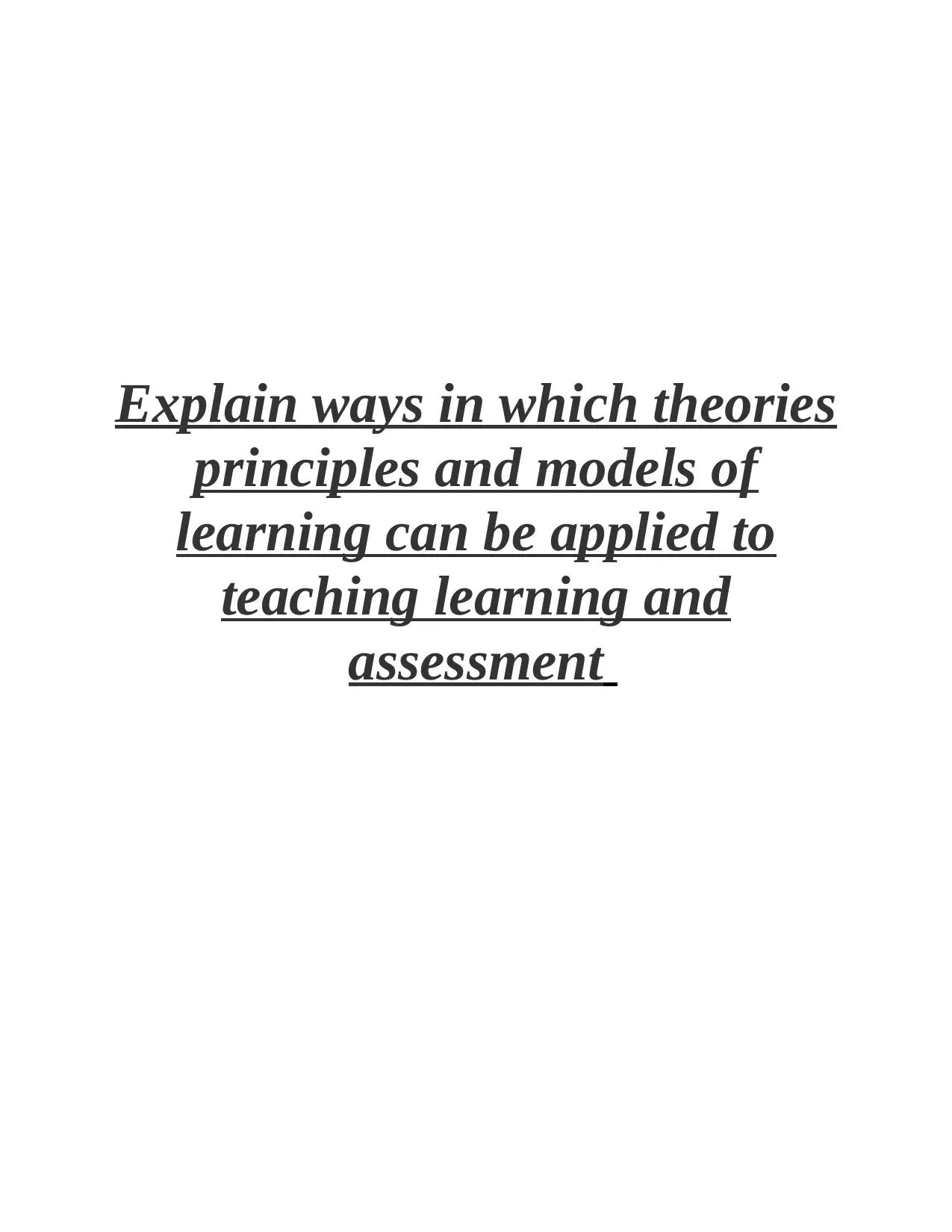
Explain ways in which theories
principles and models of
learning can be applied to
teaching learning and
assessment
principles and models of
learning can be applied to
teaching learning and
assessment
Paraphrase This Document
Need a fresh take? Get an instant paraphrase of this document with our AI Paraphraser
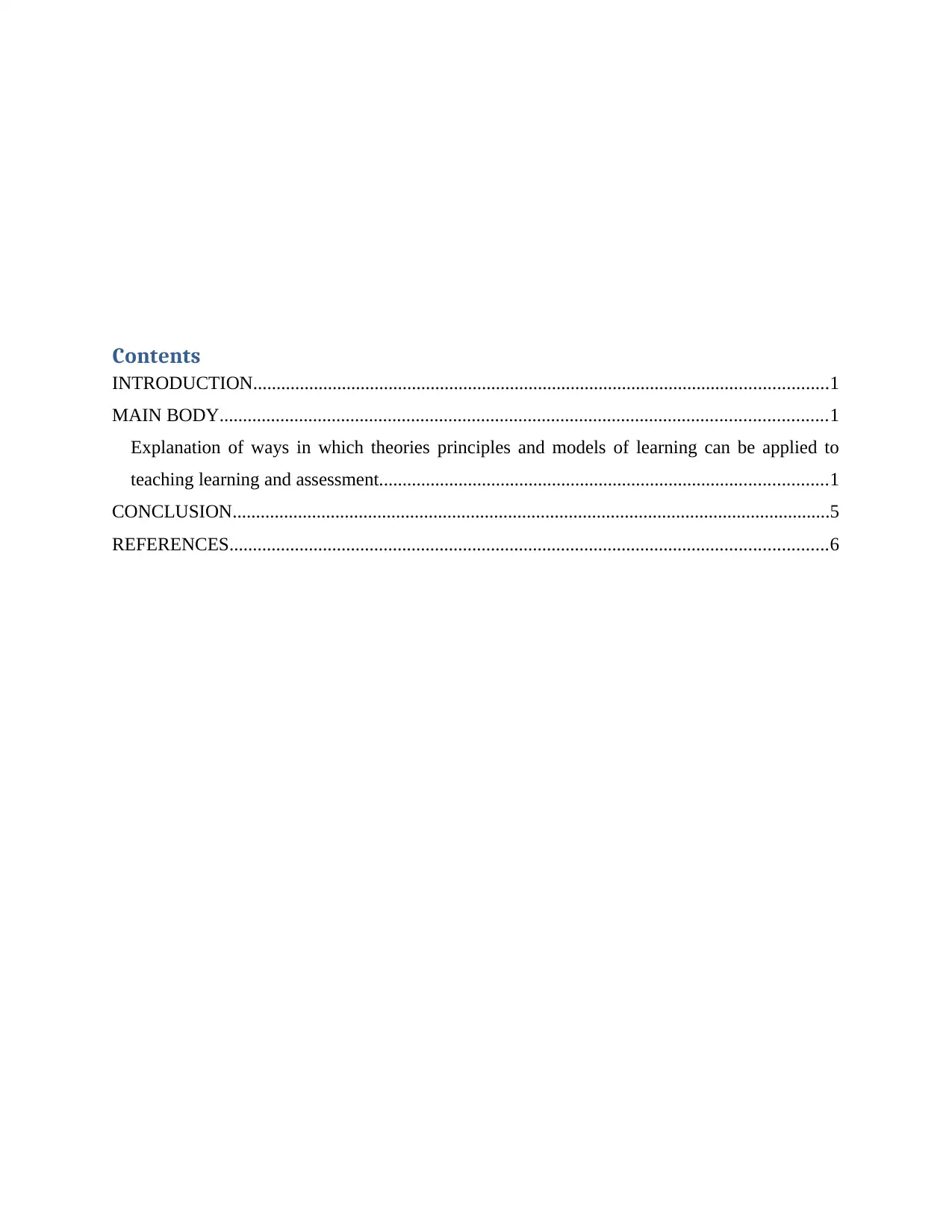
Contents
INTRODUCTION...........................................................................................................................1
MAIN BODY..................................................................................................................................1
Explanation of ways in which theories principles and models of learning can be applied to
teaching learning and assessment................................................................................................1
CONCLUSION................................................................................................................................5
REFERENCES................................................................................................................................6
INTRODUCTION...........................................................................................................................1
MAIN BODY..................................................................................................................................1
Explanation of ways in which theories principles and models of learning can be applied to
teaching learning and assessment................................................................................................1
CONCLUSION................................................................................................................................5
REFERENCES................................................................................................................................6
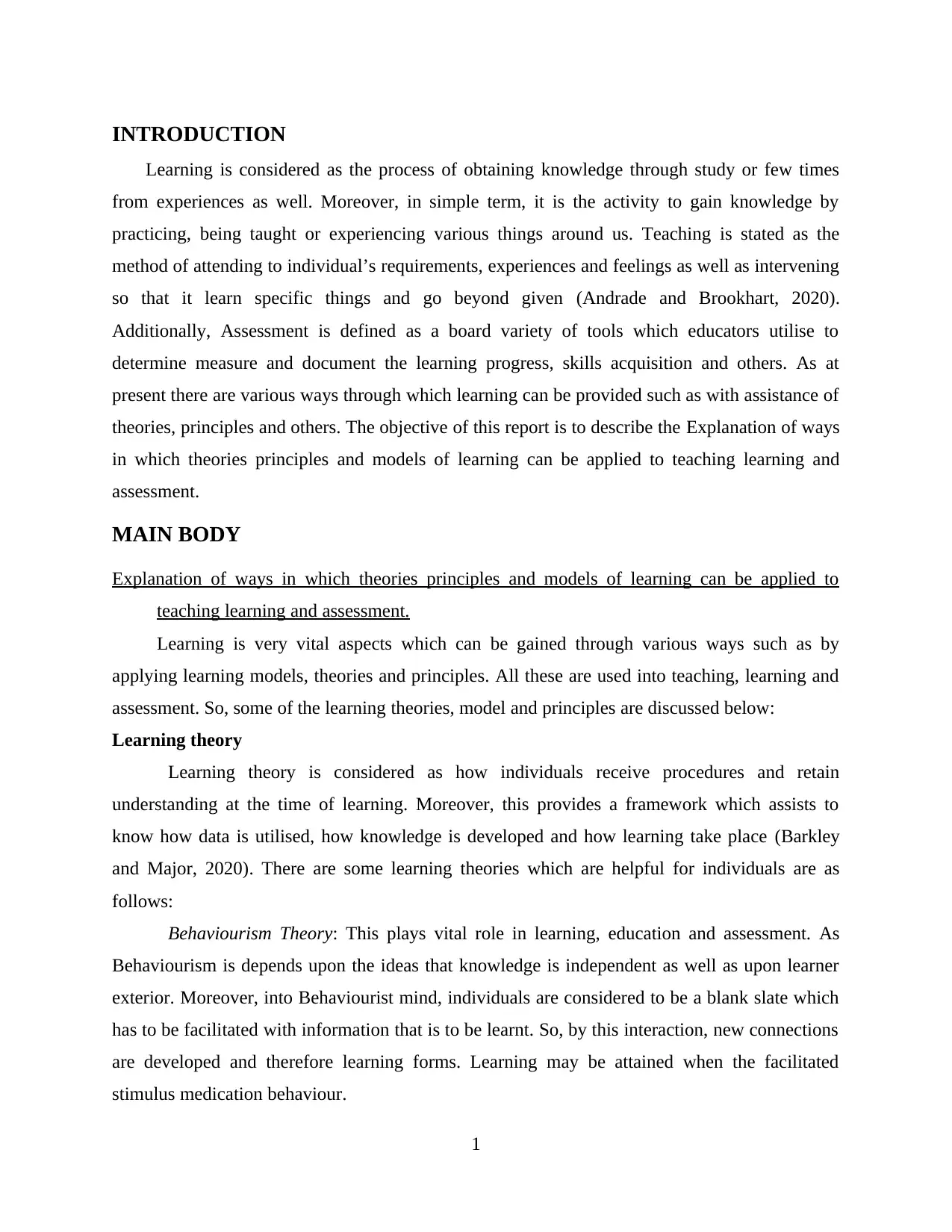
INTRODUCTION
Learning is considered as the process of obtaining knowledge through study or few times
from experiences as well. Moreover, in simple term, it is the activity to gain knowledge by
practicing, being taught or experiencing various things around us. Teaching is stated as the
method of attending to individual’s requirements, experiences and feelings as well as intervening
so that it learn specific things and go beyond given (Andrade and Brookhart, 2020).
Additionally, Assessment is defined as a board variety of tools which educators utilise to
determine measure and document the learning progress, skills acquisition and others. As at
present there are various ways through which learning can be provided such as with assistance of
theories, principles and others. The objective of this report is to describe the Explanation of ways
in which theories principles and models of learning can be applied to teaching learning and
assessment.
MAIN BODY
Explanation of ways in which theories principles and models of learning can be applied to
teaching learning and assessment.
Learning is very vital aspects which can be gained through various ways such as by
applying learning models, theories and principles. All these are used into teaching, learning and
assessment. So, some of the learning theories, model and principles are discussed below:
Learning theory
Learning theory is considered as how individuals receive procedures and retain
understanding at the time of learning. Moreover, this provides a framework which assists to
know how data is utilised, how knowledge is developed and how learning take place (Barkley
and Major, 2020). There are some learning theories which are helpful for individuals are as
follows:
Behaviourism Theory: This plays vital role in learning, education and assessment. As
Behaviourism is depends upon the ideas that knowledge is independent as well as upon learner
exterior. Moreover, into Behaviourist mind, individuals are considered to be a blank slate which
has to be facilitated with information that is to be learnt. So, by this interaction, new connections
are developed and therefore learning forms. Learning may be attained when the facilitated
stimulus medication behaviour.
1
Learning is considered as the process of obtaining knowledge through study or few times
from experiences as well. Moreover, in simple term, it is the activity to gain knowledge by
practicing, being taught or experiencing various things around us. Teaching is stated as the
method of attending to individual’s requirements, experiences and feelings as well as intervening
so that it learn specific things and go beyond given (Andrade and Brookhart, 2020).
Additionally, Assessment is defined as a board variety of tools which educators utilise to
determine measure and document the learning progress, skills acquisition and others. As at
present there are various ways through which learning can be provided such as with assistance of
theories, principles and others. The objective of this report is to describe the Explanation of ways
in which theories principles and models of learning can be applied to teaching learning and
assessment.
MAIN BODY
Explanation of ways in which theories principles and models of learning can be applied to
teaching learning and assessment.
Learning is very vital aspects which can be gained through various ways such as by
applying learning models, theories and principles. All these are used into teaching, learning and
assessment. So, some of the learning theories, model and principles are discussed below:
Learning theory
Learning theory is considered as how individuals receive procedures and retain
understanding at the time of learning. Moreover, this provides a framework which assists to
know how data is utilised, how knowledge is developed and how learning take place (Barkley
and Major, 2020). There are some learning theories which are helpful for individuals are as
follows:
Behaviourism Theory: This plays vital role in learning, education and assessment. As
Behaviourism is depends upon the ideas that knowledge is independent as well as upon learner
exterior. Moreover, into Behaviourist mind, individuals are considered to be a blank slate which
has to be facilitated with information that is to be learnt. So, by this interaction, new connections
are developed and therefore learning forms. Learning may be attained when the facilitated
stimulus medication behaviour.
1
⊘ This is a preview!⊘
Do you want full access?
Subscribe today to unlock all pages.

Trusted by 1+ million students worldwide
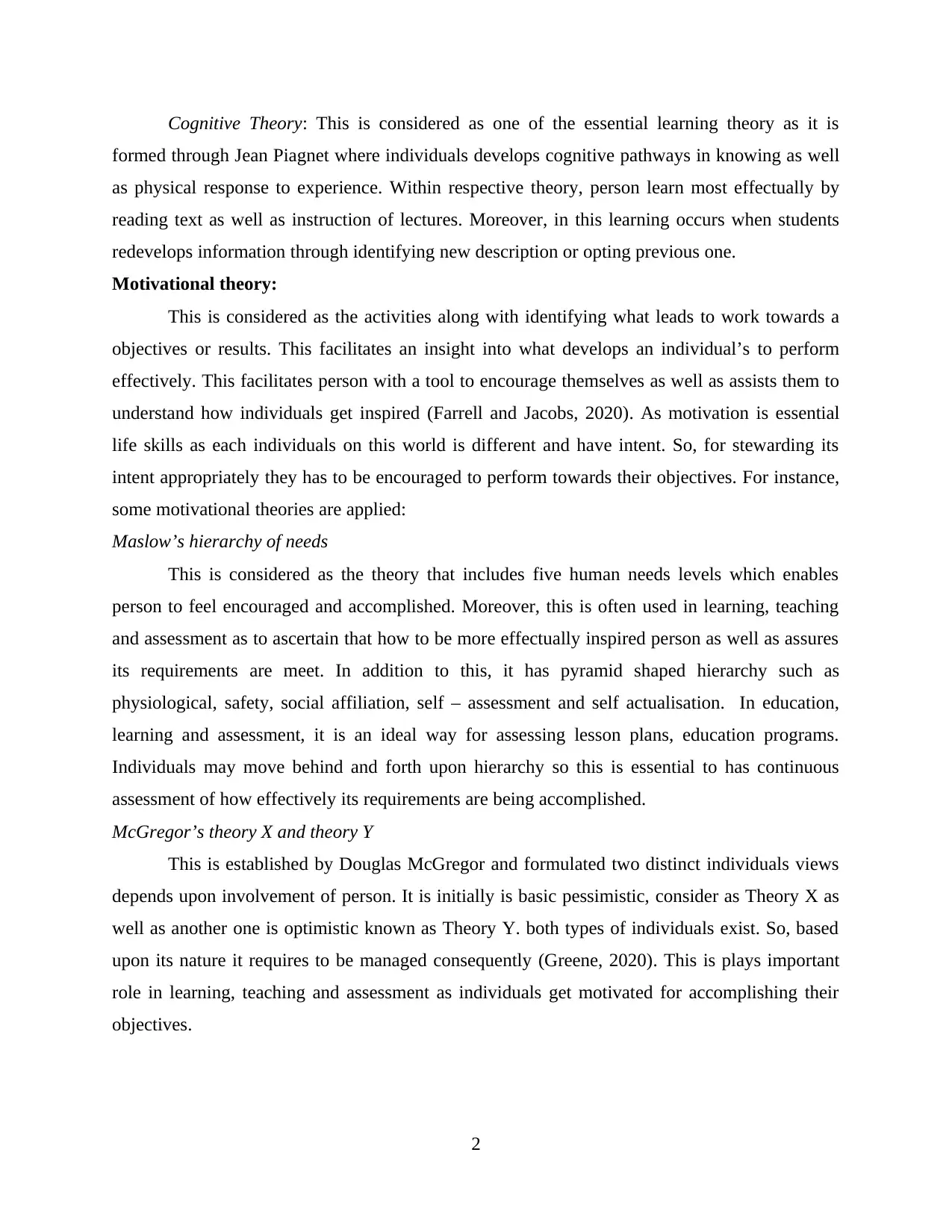
Cognitive Theory: This is considered as one of the essential learning theory as it is
formed through Jean Piagnet where individuals develops cognitive pathways in knowing as well
as physical response to experience. Within respective theory, person learn most effectually by
reading text as well as instruction of lectures. Moreover, in this learning occurs when students
redevelops information through identifying new description or opting previous one.
Motivational theory:
This is considered as the activities along with identifying what leads to work towards a
objectives or results. This facilitates an insight into what develops an individual’s to perform
effectively. This facilitates person with a tool to encourage themselves as well as assists them to
understand how individuals get inspired (Farrell and Jacobs, 2020). As motivation is essential
life skills as each individuals on this world is different and have intent. So, for stewarding its
intent appropriately they has to be encouraged to perform towards their objectives. For instance,
some motivational theories are applied:
Maslow’s hierarchy of needs
This is considered as the theory that includes five human needs levels which enables
person to feel encouraged and accomplished. Moreover, this is often used in learning, teaching
and assessment as to ascertain that how to be more effectually inspired person as well as assures
its requirements are meet. In addition to this, it has pyramid shaped hierarchy such as
physiological, safety, social affiliation, self – assessment and self actualisation. In education,
learning and assessment, it is an ideal way for assessing lesson plans, education programs.
Individuals may move behind and forth upon hierarchy so this is essential to has continuous
assessment of how effectively its requirements are being accomplished.
McGregor’s theory X and theory Y
This is established by Douglas McGregor and formulated two distinct individuals views
depends upon involvement of person. It is initially is basic pessimistic, consider as Theory X as
well as another one is optimistic known as Theory Y. both types of individuals exist. So, based
upon its nature it requires to be managed consequently (Greene, 2020). This is plays important
role in learning, teaching and assessment as individuals get motivated for accomplishing their
objectives.
2
formed through Jean Piagnet where individuals develops cognitive pathways in knowing as well
as physical response to experience. Within respective theory, person learn most effectually by
reading text as well as instruction of lectures. Moreover, in this learning occurs when students
redevelops information through identifying new description or opting previous one.
Motivational theory:
This is considered as the activities along with identifying what leads to work towards a
objectives or results. This facilitates an insight into what develops an individual’s to perform
effectively. This facilitates person with a tool to encourage themselves as well as assists them to
understand how individuals get inspired (Farrell and Jacobs, 2020). As motivation is essential
life skills as each individuals on this world is different and have intent. So, for stewarding its
intent appropriately they has to be encouraged to perform towards their objectives. For instance,
some motivational theories are applied:
Maslow’s hierarchy of needs
This is considered as the theory that includes five human needs levels which enables
person to feel encouraged and accomplished. Moreover, this is often used in learning, teaching
and assessment as to ascertain that how to be more effectually inspired person as well as assures
its requirements are meet. In addition to this, it has pyramid shaped hierarchy such as
physiological, safety, social affiliation, self – assessment and self actualisation. In education,
learning and assessment, it is an ideal way for assessing lesson plans, education programs.
Individuals may move behind and forth upon hierarchy so this is essential to has continuous
assessment of how effectively its requirements are being accomplished.
McGregor’s theory X and theory Y
This is established by Douglas McGregor and formulated two distinct individuals views
depends upon involvement of person. It is initially is basic pessimistic, consider as Theory X as
well as another one is optimistic known as Theory Y. both types of individuals exist. So, based
upon its nature it requires to be managed consequently (Greene, 2020). This is plays important
role in learning, teaching and assessment as individuals get motivated for accomplishing their
objectives.
2
Paraphrase This Document
Need a fresh take? Get an instant paraphrase of this document with our AI Paraphraser
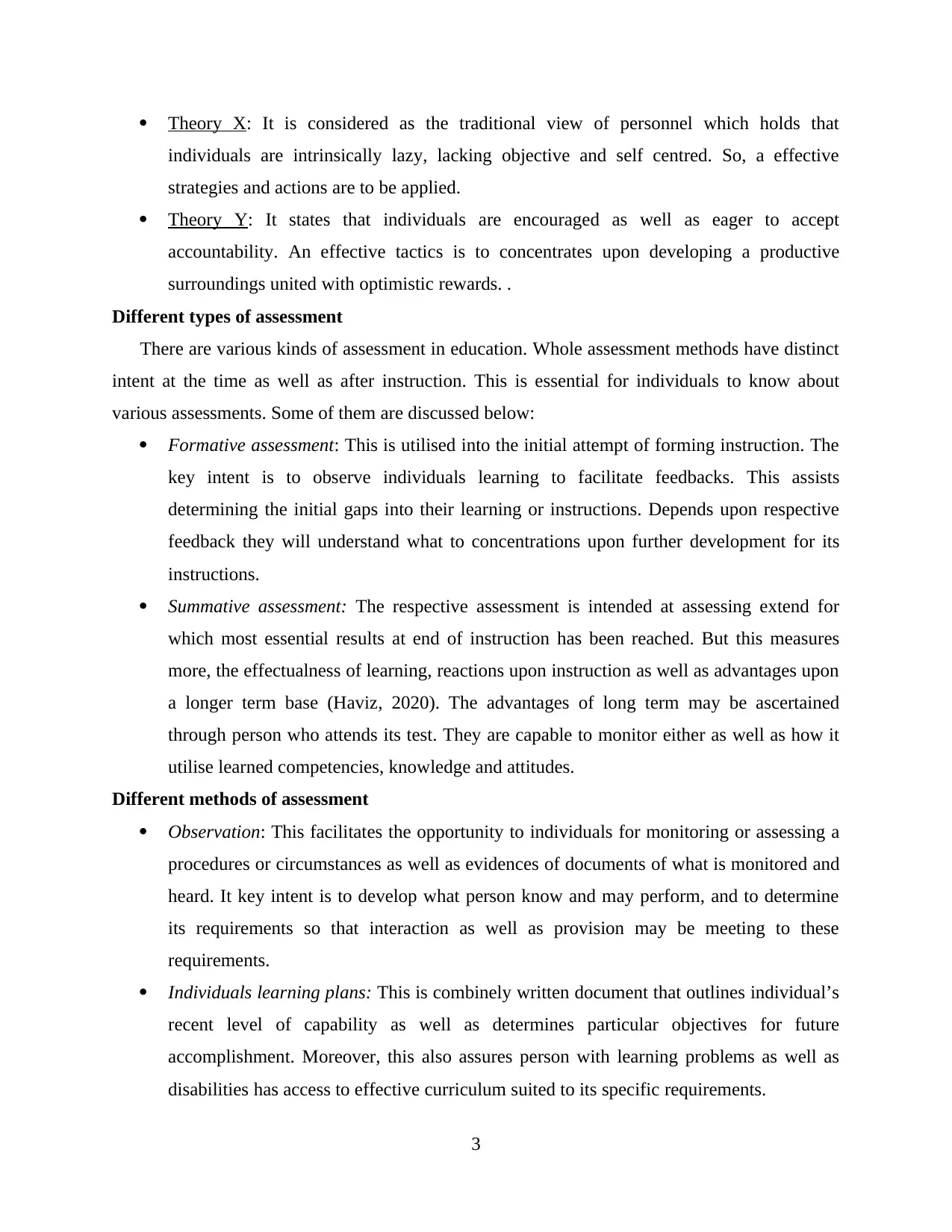
Theory X: It is considered as the traditional view of personnel which holds that
individuals are intrinsically lazy, lacking objective and self centred. So, a effective
strategies and actions are to be applied.
Theory Y: It states that individuals are encouraged as well as eager to accept
accountability. An effective tactics is to concentrates upon developing a productive
surroundings united with optimistic rewards. .
Different types of assessment
There are various kinds of assessment in education. Whole assessment methods have distinct
intent at the time as well as after instruction. This is essential for individuals to know about
various assessments. Some of them are discussed below:
Formative assessment: This is utilised into the initial attempt of forming instruction. The
key intent is to observe individuals learning to facilitate feedbacks. This assists
determining the initial gaps into their learning or instructions. Depends upon respective
feedback they will understand what to concentrations upon further development for its
instructions.
Summative assessment: The respective assessment is intended at assessing extend for
which most essential results at end of instruction has been reached. But this measures
more, the effectualness of learning, reactions upon instruction as well as advantages upon
a longer term base (Haviz, 2020). The advantages of long term may be ascertained
through person who attends its test. They are capable to monitor either as well as how it
utilise learned competencies, knowledge and attitudes.
Different methods of assessment
Observation: This facilitates the opportunity to individuals for monitoring or assessing a
procedures or circumstances as well as evidences of documents of what is monitored and
heard. It key intent is to develop what person know and may perform, and to determine
its requirements so that interaction as well as provision may be meeting to these
requirements.
Individuals learning plans: This is combinely written document that outlines individual’s
recent level of capability as well as determines particular objectives for future
accomplishment. Moreover, this also assures person with learning problems as well as
disabilities has access to effective curriculum suited to its specific requirements.
3
individuals are intrinsically lazy, lacking objective and self centred. So, a effective
strategies and actions are to be applied.
Theory Y: It states that individuals are encouraged as well as eager to accept
accountability. An effective tactics is to concentrates upon developing a productive
surroundings united with optimistic rewards. .
Different types of assessment
There are various kinds of assessment in education. Whole assessment methods have distinct
intent at the time as well as after instruction. This is essential for individuals to know about
various assessments. Some of them are discussed below:
Formative assessment: This is utilised into the initial attempt of forming instruction. The
key intent is to observe individuals learning to facilitate feedbacks. This assists
determining the initial gaps into their learning or instructions. Depends upon respective
feedback they will understand what to concentrations upon further development for its
instructions.
Summative assessment: The respective assessment is intended at assessing extend for
which most essential results at end of instruction has been reached. But this measures
more, the effectualness of learning, reactions upon instruction as well as advantages upon
a longer term base (Haviz, 2020). The advantages of long term may be ascertained
through person who attends its test. They are capable to monitor either as well as how it
utilise learned competencies, knowledge and attitudes.
Different methods of assessment
Observation: This facilitates the opportunity to individuals for monitoring or assessing a
procedures or circumstances as well as evidences of documents of what is monitored and
heard. It key intent is to develop what person know and may perform, and to determine
its requirements so that interaction as well as provision may be meeting to these
requirements.
Individuals learning plans: This is combinely written document that outlines individual’s
recent level of capability as well as determines particular objectives for future
accomplishment. Moreover, this also assures person with learning problems as well as
disabilities has access to effective curriculum suited to its specific requirements.
3
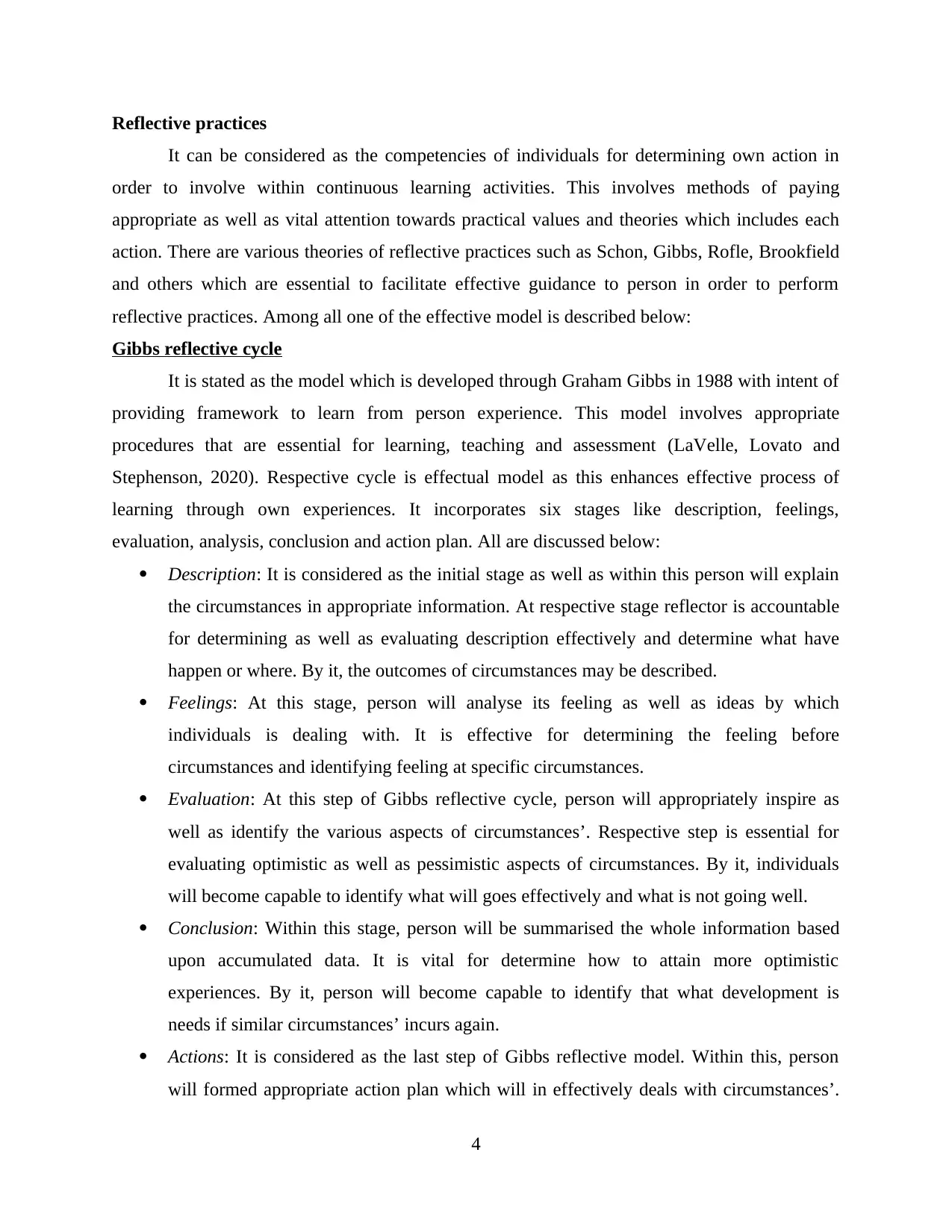
Reflective practices
It can be considered as the competencies of individuals for determining own action in
order to involve within continuous learning activities. This involves methods of paying
appropriate as well as vital attention towards practical values and theories which includes each
action. There are various theories of reflective practices such as Schon, Gibbs, Rofle, Brookfield
and others which are essential to facilitate effective guidance to person in order to perform
reflective practices. Among all one of the effective model is described below:
Gibbs reflective cycle
It is stated as the model which is developed through Graham Gibbs in 1988 with intent of
providing framework to learn from person experience. This model involves appropriate
procedures that are essential for learning, teaching and assessment (LaVelle, Lovato and
Stephenson, 2020). Respective cycle is effectual model as this enhances effective process of
learning through own experiences. It incorporates six stages like description, feelings,
evaluation, analysis, conclusion and action plan. All are discussed below:
Description: It is considered as the initial stage as well as within this person will explain
the circumstances in appropriate information. At respective stage reflector is accountable
for determining as well as evaluating description effectively and determine what have
happen or where. By it, the outcomes of circumstances may be described.
Feelings: At this stage, person will analyse its feeling as well as ideas by which
individuals is dealing with. It is effective for determining the feeling before
circumstances and identifying feeling at specific circumstances.
Evaluation: At this step of Gibbs reflective cycle, person will appropriately inspire as
well as identify the various aspects of circumstances’. Respective step is essential for
evaluating optimistic as well as pessimistic aspects of circumstances. By it, individuals
will become capable to identify what will goes effectively and what is not going well.
Conclusion: Within this stage, person will be summarised the whole information based
upon accumulated data. It is vital for determine how to attain more optimistic
experiences. By it, person will become capable to identify that what development is
needs if similar circumstances’ incurs again.
Actions: It is considered as the last step of Gibbs reflective model. Within this, person
will formed appropriate action plan which will in effectively deals with circumstances’.
4
It can be considered as the competencies of individuals for determining own action in
order to involve within continuous learning activities. This involves methods of paying
appropriate as well as vital attention towards practical values and theories which includes each
action. There are various theories of reflective practices such as Schon, Gibbs, Rofle, Brookfield
and others which are essential to facilitate effective guidance to person in order to perform
reflective practices. Among all one of the effective model is described below:
Gibbs reflective cycle
It is stated as the model which is developed through Graham Gibbs in 1988 with intent of
providing framework to learn from person experience. This model involves appropriate
procedures that are essential for learning, teaching and assessment (LaVelle, Lovato and
Stephenson, 2020). Respective cycle is effectual model as this enhances effective process of
learning through own experiences. It incorporates six stages like description, feelings,
evaluation, analysis, conclusion and action plan. All are discussed below:
Description: It is considered as the initial stage as well as within this person will explain
the circumstances in appropriate information. At respective stage reflector is accountable
for determining as well as evaluating description effectively and determine what have
happen or where. By it, the outcomes of circumstances may be described.
Feelings: At this stage, person will analyse its feeling as well as ideas by which
individuals is dealing with. It is effective for determining the feeling before
circumstances and identifying feeling at specific circumstances.
Evaluation: At this step of Gibbs reflective cycle, person will appropriately inspire as
well as identify the various aspects of circumstances’. Respective step is essential for
evaluating optimistic as well as pessimistic aspects of circumstances. By it, individuals
will become capable to identify what will goes effectively and what is not going well.
Conclusion: Within this stage, person will be summarised the whole information based
upon accumulated data. It is vital for determine how to attain more optimistic
experiences. By it, person will become capable to identify that what development is
needs if similar circumstances’ incurs again.
Actions: It is considered as the last step of Gibbs reflective model. Within this, person
will formed appropriate action plan which will in effectively deals with circumstances’.
4
⊘ This is a preview!⊘
Do you want full access?
Subscribe today to unlock all pages.

Trusted by 1+ million students worldwide
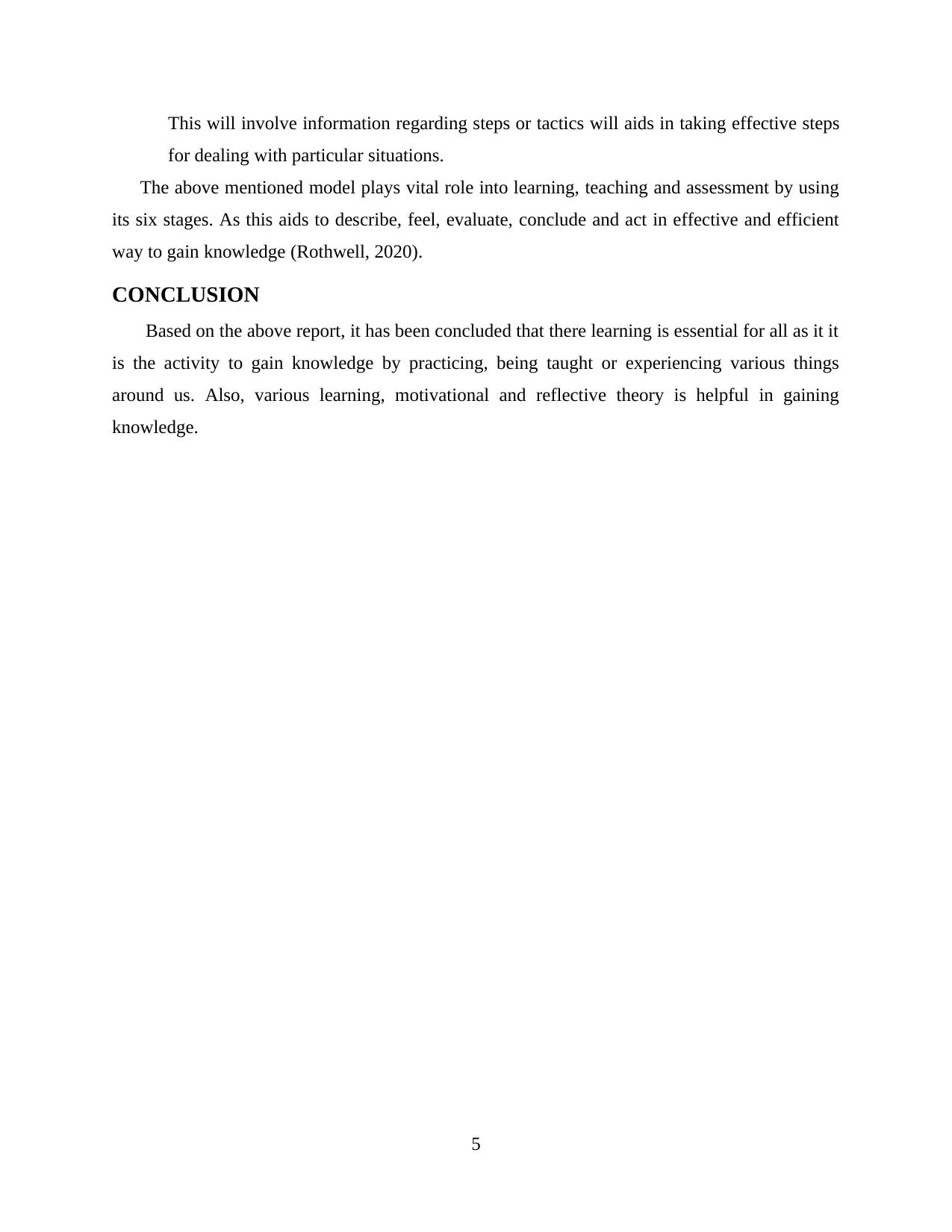
This will involve information regarding steps or tactics will aids in taking effective steps
for dealing with particular situations.
The above mentioned model plays vital role into learning, teaching and assessment by using
its six stages. As this aids to describe, feel, evaluate, conclude and act in effective and efficient
way to gain knowledge (Rothwell, 2020).
CONCLUSION
Based on the above report, it has been concluded that there learning is essential for all as it it
is the activity to gain knowledge by practicing, being taught or experiencing various things
around us. Also, various learning, motivational and reflective theory is helpful in gaining
knowledge.
5
for dealing with particular situations.
The above mentioned model plays vital role into learning, teaching and assessment by using
its six stages. As this aids to describe, feel, evaluate, conclude and act in effective and efficient
way to gain knowledge (Rothwell, 2020).
CONCLUSION
Based on the above report, it has been concluded that there learning is essential for all as it it
is the activity to gain knowledge by practicing, being taught or experiencing various things
around us. Also, various learning, motivational and reflective theory is helpful in gaining
knowledge.
5
Paraphrase This Document
Need a fresh take? Get an instant paraphrase of this document with our AI Paraphraser
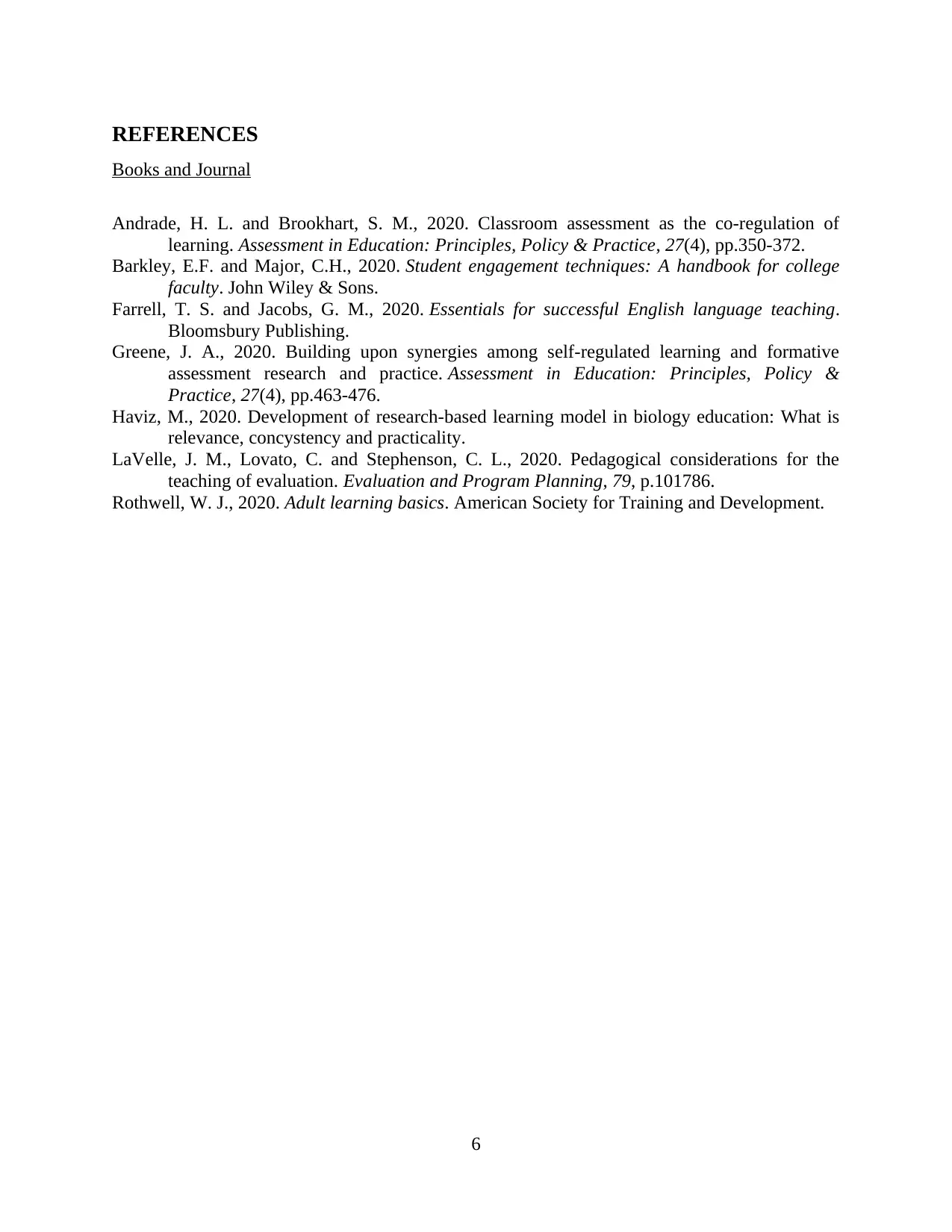
REFERENCES
Books and Journal
Andrade, H. L. and Brookhart, S. M., 2020. Classroom assessment as the co-regulation of
learning. Assessment in Education: Principles, Policy & Practice, 27(4), pp.350-372.
Barkley, E.F. and Major, C.H., 2020. Student engagement techniques: A handbook for college
faculty. John Wiley & Sons.
Farrell, T. S. and Jacobs, G. M., 2020. Essentials for successful English language teaching.
Bloomsbury Publishing.
Greene, J. A., 2020. Building upon synergies among self-regulated learning and formative
assessment research and practice. Assessment in Education: Principles, Policy &
Practice, 27(4), pp.463-476.
Haviz, M., 2020. Development of research-based learning model in biology education: What is
relevance, concystency and practicality.
LaVelle, J. M., Lovato, C. and Stephenson, C. L., 2020. Pedagogical considerations for the
teaching of evaluation. Evaluation and Program Planning, 79, p.101786.
Rothwell, W. J., 2020. Adult learning basics. American Society for Training and Development.
6
Books and Journal
Andrade, H. L. and Brookhart, S. M., 2020. Classroom assessment as the co-regulation of
learning. Assessment in Education: Principles, Policy & Practice, 27(4), pp.350-372.
Barkley, E.F. and Major, C.H., 2020. Student engagement techniques: A handbook for college
faculty. John Wiley & Sons.
Farrell, T. S. and Jacobs, G. M., 2020. Essentials for successful English language teaching.
Bloomsbury Publishing.
Greene, J. A., 2020. Building upon synergies among self-regulated learning and formative
assessment research and practice. Assessment in Education: Principles, Policy &
Practice, 27(4), pp.463-476.
Haviz, M., 2020. Development of research-based learning model in biology education: What is
relevance, concystency and practicality.
LaVelle, J. M., Lovato, C. and Stephenson, C. L., 2020. Pedagogical considerations for the
teaching of evaluation. Evaluation and Program Planning, 79, p.101786.
Rothwell, W. J., 2020. Adult learning basics. American Society for Training and Development.
6
1 out of 8
Related Documents
Your All-in-One AI-Powered Toolkit for Academic Success.
+13062052269
info@desklib.com
Available 24*7 on WhatsApp / Email
![[object Object]](/_next/static/media/star-bottom.7253800d.svg)
Unlock your academic potential
Copyright © 2020–2026 A2Z Services. All Rights Reserved. Developed and managed by ZUCOL.



